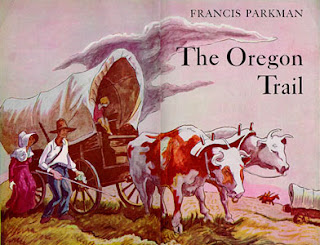According to J. Peterman, today we celebrate the Oregon Trail and creamsicles. One of my favorite history books is The Oregon Trail by Francis Parkman. I like the 1946 edition with illustrations by Thomas Hart Benton. Here's a copy of a 1925 edition with illustrations by Wyeth and Remington. Unfortunately, it has been sold on ebay. Seems like the "Remington" edition dates back to 1892. Or, you can get the Library of America edition, which also includes The Conspiracy of Pontiac.
According to J. Peterman, today we celebrate the Oregon Trail and creamsicles. One of my favorite history books is The Oregon Trail by Francis Parkman. I like the 1946 edition with illustrations by Thomas Hart Benton. Here's a copy of a 1925 edition with illustrations by Wyeth and Remington. Unfortunately, it has been sold on ebay. Seems like the "Remington" edition dates back to 1892. Or, you can get the Library of America edition, which also includes The Conspiracy of Pontiac.

Reading Ian Fraziers"The Great Plains" and he mentions Parkmans book several times.
ReplyDeleteI really liked Frazier's book.
ReplyDeleteAvrds I took it east with me along with The Lakotas and the Black Hills and some of the Indian History overlapped which was nice.I want to get a copy of his On the Rez.bosox
ReplyDeleteI have On the Rez but have only read parts of it, and don't remember it as distinctly as Great Plains. I like his work.
ReplyDeleteAcme v Coyote isn't bad, either!